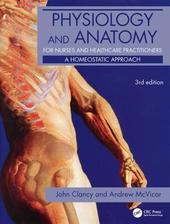
|
Physiology and Anatomy for Nurses and Healthcare Practitioners: a Homeostatic Approach
Paperback
Main Details
| Title |
Physiology and Anatomy for Nurses and Healthcare Practitioners: a Homeostatic Approach
|
| Authors and Contributors |
By (author) John Clancy
|
|
By (author) Andy Ang
|
|
By (author) Andrew J. McVicar
|
| Physical Properties |
| Format:Paperback | | Pages:768 | | Dimensions(mm): Height 276,Width 210 |
|
| Category/Genre | Anatomy
Physiology |
|---|
| ISBN/Barcode |
9780340967591
|
| Classifications | Dewey:612 |
|---|
| Audience | |
|---|
| Edition |
3rd Revised edition
|
| Illustrations |
col. Illustrations
|
|
Publishing Details |
| Publisher |
Taylor & Francis Ltd
|
| Imprint |
Hodder Arnold
|
| Publication Date |
27 March 2009 |
| Publication Country |
United Kingdom
|
Description
The third edition of Physiology and Anatomy for Nurses and Healthcare Practitioners: A homeostatic approach presents homeostasis as a dynamic concept that provides the basis for understanding health and well-being. It recognises how failure to respond to homeostatic disturbances results in imbalances responsible for signs and symptoms of ill-health, and describes how healthcare interventions seek to reverse those imbalances. Accompanied by colour illustrations and a description of related anatomy, the book provides an integrated explanation of body functioning. It discusses the organisation of the human body, main features and processes that must be controlled for health, the organ systems that act as homeostatic regulators, and effectors of homeostatic regulation. It also discusses influences on homeostasis and provides case studies that place examples of ill health and health care into the context of homeostasis. Features of the third edition include: An overview of microbiology and principles of infection management Expanded information on pharmacological principles and actions of the major classes of drugs Expanded discussion on physiological functions in relation to specific pathologies Updates on how the Human Genome project has impacted healthcare Additional case studies to illustrate the healthcare provider's role as an external agent of homeostatic control Photographs of common clinical conditions Access to an accompanying website with supplemental information An essential physiology and anatomy text, this book guides readers through the basic structure and functions of the body systems to more complex issues of clinical disorders and healthcare practice. Coverage includes the cardiovascular, lymphatic, nervous, endocrine, reproductive, and respiratory systems as well as skeletal muscle, embryo development, and circadian rhythms.
Author Biography
John Clancy is a Lecturer in Human Applied Sciences, School of Nursing and Midwifery, University of East Anglia, Norwich, UK Andrew McVicar is a Reader the Department of Mental Health and Learning Disabilities, Faculty of Health & Social Care, Anglia Ruskin University, Chelmsford, UK
|